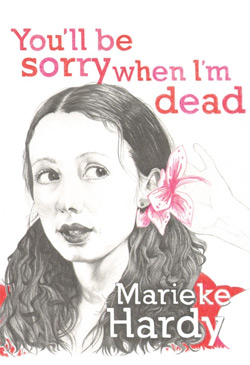The Weekend Australian book review: ‘Women Of Letters’, curated by Marieke Hardy and Michaela McGuire, December 2011
A book review for The Australian, reproduced below in its entirety.
Love letters for weird families and those nights best forgotten
Women of Letters: Reviving the Lost Art of Correspondence
Curated by Marieke Hardy and Michaela McGuire
Penguin, 412pp, $29.95
A fine cross-section of humanity – largely womankind – is on display in Women of Letters, a book born from a series of live letter reading and writing events “celebrating wine, women and words” in eastern capital cities in 2010.
The events were founded by writers Marieke Hardy and Michaela McGuire through their desire to “showcase brilliant female minds”, and also in the name of a good cause: all royalties from the sale of this book will go to Edgar’s Mission, an animal shelter in Victoria.
Comprising 69 authors, many of whom are well-known Australian musicians, writers and actresses, and 16 topics, Women of Letters contains many surprises, joys and profound learnings. Here are but a handful of moments that this reviewer felt most appealing:
Comedian Judith Lucy’s letter “to the night I’d rather forget” taught her “the invaluable lesson that it is never a good idea to combine alcohol with being a f . . kwit”. In a letter “to my first pin-up”, Adam Ant, former Triple J Magazine editor Jenny Valentish reflects on music journalism: “writing about tortured artists for a living, my keyboard is constantly awash with salty sentiment . . . I’m like a professional enabler for these people”. Actress Claudia Karvan and comedian Virginia Gay take a literal interpretation of “a love letter” by addressing theirs to the concept of love itself, with very different outcomes.
In a letter “to the moment it all fell apart”, musician Amanda Roff strikes on speculative fiction so absorbing that John Birmingham would give a nod of approval. “I remember lining up outside Melbourne Zoo, waiting for the army to sell the last of the meat,” she writes, taking the reader deep into her post-apocalyptic world.
This freedom of the open brief offered each writer the ability to choose how much of themselves to reveal. Many opt for brazen honesty. Singer Missy Higgins is particularly touching when writing “to my turning point”: she discusses her first experiences with depression. “I’m thankful to you, dear Turning Point, for . . . showing me that I’m not alone, that it’s OK to be sad.” In “to the letter I wish I’d written”, musician Georgia Fields asks, “Why am I still, at 27 years of age, so paralysingly terrified of what people think of me?” she writes. “Why can’t I just relax and be myself?”
The few blokes who appear in these pages generally opt for sentimentality too, especially when writing “to the woman who changed my life”.
Bob Ellis writes to his wife: “You are more than I deserved, and I less than you deserved, and this is too hard.” Rocker Tim Rogers is brutally honest in his self-assessment while writing to his ex-wife. “I wanted to thank you for what you’ve done to me. It wasn’t intended to be a love letter. But what changes someone more completely than love, and loss?”
Comedian and actor Eddie Perfect comes up with a great line while writing to his wife: “I don’t know what a family is, how to define it, other than as a collection of people who bind themselves together and get weirder and weirder until no one understands them.”
The highlights are so plentiful that I must mention a few more: Crikey editor Sophie Black writing “to my first boss” about her 1993 work experience at New Idea (“in one working week, at five dollars a day, I learnt enough to put me off journalism for the next decade”); Jennifer Byrne’s decision to read a heart-wrenching letter written in 1910 by a dying explorer on a fraught expedition to Antarctica; Noni Hazlehurst writing “to my ghosts”, which turn out to be the “gloriously impulsive, intuitive, emotional” voices in her head, and radio broadcaster Fee-B Squared writing “to my nemesis”, her bad back.
Women of Letters offers a joyous bounty of many voices, writing styles, laughs and regrets. Having read this book, I feel as though I know humans and their various conditions much better.
Andrew McMillen is a Brisbane-based freelance journalist.
This review was originally published in The Weekend Australian Review on December 31. For more on Women Of Letters, visit their website.
